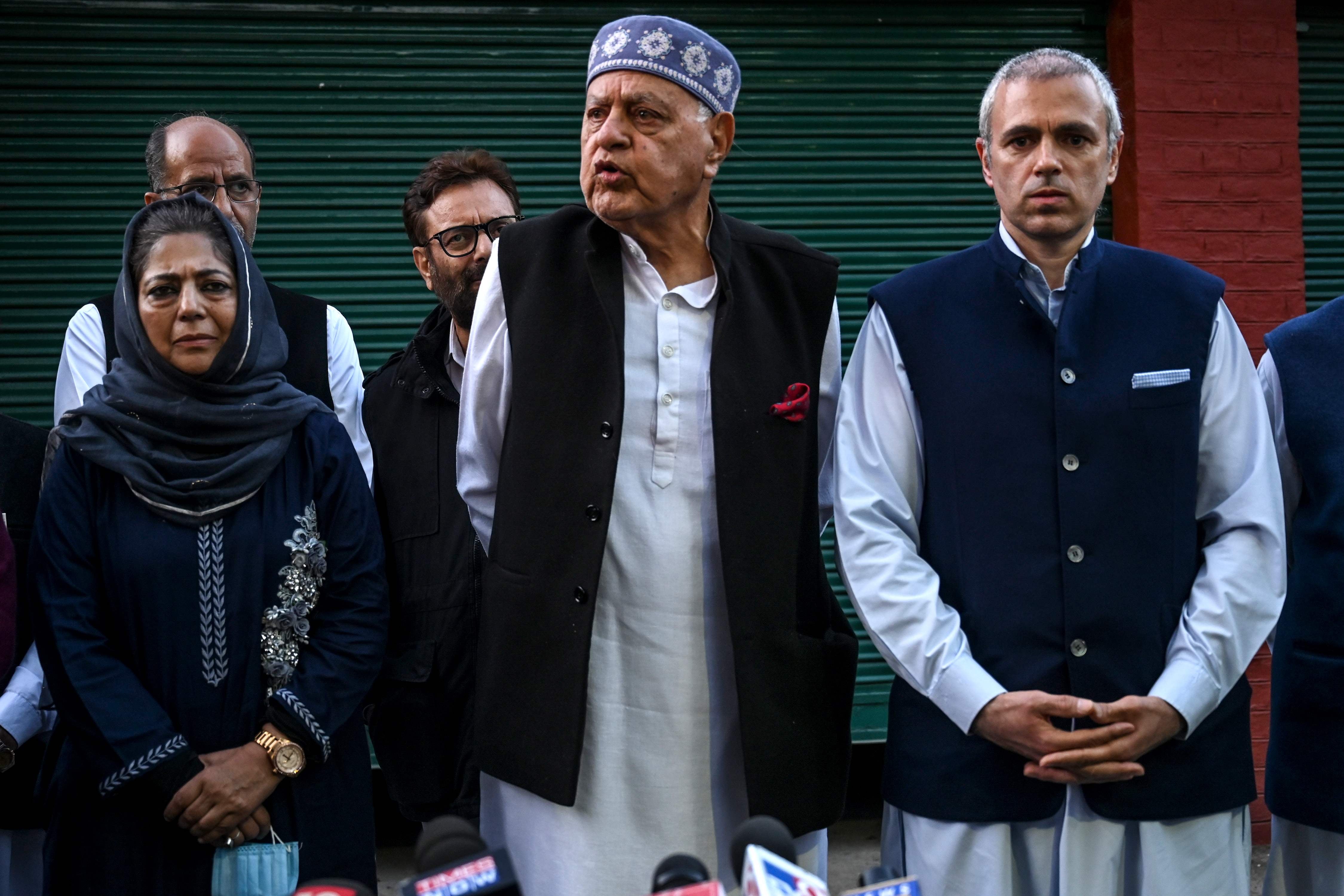Kashmir's warring regional parties join together in unprecedented alliance to take on Indian government
The leaders of Kashmir have been released from an year long detention under the Public safety Act

Kashmir’s most senior political leaders have come together to announce an alliance against the central Indian government of Narendra Modi, denouncing his decision more than a year ago to strip the region of its special status and autonomy.
The meeting included all regional parties of the former state of Jammu and Kashmir, who until recently fought bitterly at elections for local dominance.
Thursday’s unprecedented meeting was made possible by the release, after more than a year, of former chief minister and PDP party president Mehbooba Mufti, who was finally freed from house arrest on Tuesday.
At the meeting, hosted by National Conference party president Farooq Abdullah, the parties agreed to work together for the restoration of the status enjoyed by Kashmir prior to the 5 August 2019 move by Delhi to revoke it.
Mr Abdullah, a three-time chief minister of the erstwhile state and current MP, told reporters that the parties would form a grouping known as the “People’s Alliance”.
"Ours is a constitutional battle. We shall struggle for restoration of what was snatched from J&K and Ladakh. We are going to meet again.”
Nasir Sogami, a senior member of the National Conference party, told The Independent: “We are going to fight for what is rightly ours and what our constitution guarantees, which was taken away from us."
And a spokesperson for the PDP said all had agreed to the People’s Alliance name. “The alliance will constitutionally fight for the restoration of the August 4 position of J&K."
What happened to Kashmir?
The last time all Kashmir’s regional parties met was on 4 August 2019, when they were alarmed by the arrival of a flood of paramilitary forces dispatched by the central government, which also asked tourists to leave the region.
Then, expecting what was to come, they signed what is now known as the Gupkar Declaration, announcing that they were opposed to any attempt to alter the status quo in Kashmir without consultation.
The next day, the Modi government revoked two articles of the Indian constitution, Article 370 and Article 35a, which together granted Kashmir the right to have its own mini-constitution, and to prevent people from outside the state from buying and owning land there.
The region is already believed to be the most highly militarised in the world, but restrictions became even tighter after 5 August, with access to the internet severed for many months on end and public movement closely controlled. Things were just starting to improve earlier this year when the arrival of the Covid-19 pandemic plunged Kashmiris into lockdown once more.
Last August the Modi government also broke up the state into two union territories, a move which experts say has weakened the local government structure and allows the centre to permanently exercise direct control over the region through a governor.
Revoking the special status of Kashmir had been a part of the ruling BJP’s agenda for years and featured in their election manifestoes in both the 2014 and 2019 votes – which they won by landslides.
Why did J&K have special status?
Kashmir has been a disputed territory between India and Pakistan since 1947 and India and China since 1962. The Muslim majority state has been the centre of three wars between these countries after the Hindu king of the valley, Maharaja Hari Singh, decided to join India after partition.
Later split between India and Pakistan in 1972 through a Line of Control (LoC), the valley has also been witnessing armed conflicts within, with demands of “Azadi” (freedom) from India. India has accused Pakistan of playing a role in fanning the divide, while those in favour of Kashmir’s independence say the region was promised a plebiscite on the matter during its accession.
Experts say that Article 370, along with being a constitutional guarantee of the region’s special status, was also relevant for people of Kashmir to have a sense of identity.
Join our commenting forum
Join thought-provoking conversations, follow other Independent readers and see their replies
Comments
Bookmark popover
Removed from bookmarks